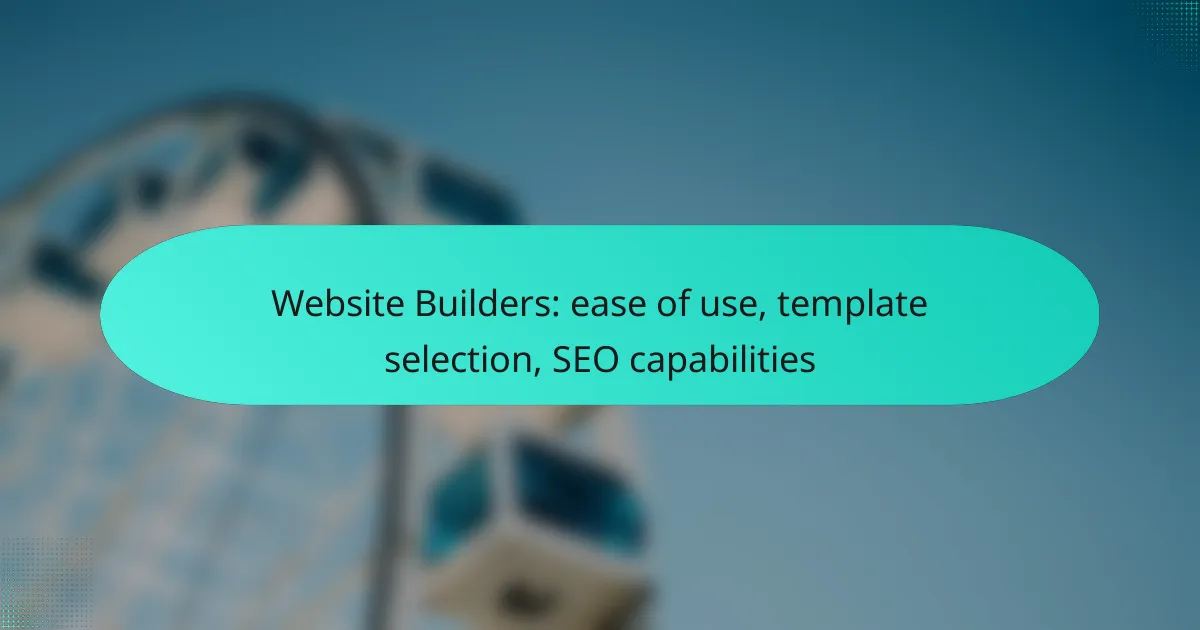Website builders like Wix, Squarespace, Weebly, and Shopify offer an accessible way for users in Canada to create websites with ease, thanks to their intuitive interfaces and diverse features. With a wide selection of customizable templates, these platforms cater to various design preferences and needs, whether for personal projects or e-commerce ventures. Additionally, they enhance SEO capabilities through integrated tools that simplify content optimization, metadata management, and mobile responsiveness, ensuring better visibility on search engines.

Which website builders are best for ease of use in Canada?
For ease of use in Canada, popular website builders like Wix, Squarespace, Weebly, and Shopify stand out due to their intuitive interfaces and user-friendly features. These platforms cater to various needs, from personal blogs to e-commerce sites, making it simple for anyone to create a website without extensive technical skills.
Wix: Intuitive drag-and-drop interface
Wix offers a highly intuitive drag-and-drop interface that allows users to customize their websites easily. With hundreds of templates available, users can select a design that fits their vision and modify it without needing coding knowledge. This flexibility makes it suitable for beginners and those looking to create a unique online presence.
One key feature is the Wix ADI (Artificial Design Intelligence), which can create a personalized website based on user preferences in just a few minutes. This is particularly useful for those who want to get started quickly without delving into complex design elements.
Squarespace: User-friendly templates
Squarespace is known for its visually appealing, user-friendly templates that cater to creative professionals and businesses alike. The platform provides a seamless editing experience, allowing users to customize layouts, fonts, and colors easily. This makes it an excellent choice for photographers, artists, and small business owners who want to showcase their work effectively.
Additionally, Squarespace offers built-in features for blogging and e-commerce, which simplifies the process of adding content and selling products. Users can expect a polished, professional look without needing extensive design skills.
Weebly: Simple setup process
Weebly is recognized for its straightforward setup process, making it ideal for users who want to launch their websites quickly. The platform guides users through each step, from choosing a domain name to selecting a template, ensuring a smooth experience. This simplicity appeals to small business owners and individuals who may not be tech-savvy.
Weebly also includes essential features such as SEO tools and e-commerce capabilities, allowing users to optimize their sites for search engines and sell products online without hassle. The drag-and-drop functionality further enhances usability, making it easy to add elements like images and text blocks.
Shopify: Easy e-commerce integration
Shopify excels in providing an easy e-commerce integration experience, making it a top choice for online retailers in Canada. The platform offers a range of customizable templates specifically designed for selling products, allowing users to set up their online stores quickly. With built-in payment processing and inventory management, Shopify simplifies the complexities of running an e-commerce business.
Moreover, Shopify’s user-friendly dashboard provides insights into sales and customer behavior, helping users make informed decisions. This focus on e-commerce functionality, combined with ease of use, makes Shopify a strong contender for anyone looking to start an online store.

What template selection options do popular website builders offer?
Popular website builders provide a variety of template selection options, catering to different needs and design preferences. Users can choose from customizable templates to professionally designed themes, ensuring a suitable fit for personal or business websites.
Wix: Over 500 customizable templates
Wix offers more than 500 customizable templates, allowing users to create unique websites tailored to their specific needs. Each template is designed for various industries, such as e-commerce, portfolios, and blogs, making it easy to find a starting point that aligns with your vision.
Customization is straightforward with Wix’s drag-and-drop editor, enabling users to modify layouts, colors, and fonts without needing coding skills. However, it’s essential to ensure that the chosen template is responsive, as mobile compatibility is crucial for user experience and SEO.
Squarespace: Professionally designed themes
Squarespace features a selection of professionally designed themes that emphasize aesthetics and functionality. These themes are particularly popular among creatives and businesses looking for visually striking websites.
While Squarespace templates are less customizable than some competitors, they are optimized for mobile devices and include built-in features for blogging and e-commerce. Users should consider their specific needs, as the design may limit extensive alterations, but the polished look can enhance brand perception.
WordPress: Thousands of free and premium themes
WordPress boasts thousands of free and premium themes, providing users with extensive options for customization. This vast library caters to various niches, from personal blogs to complex business sites, allowing for significant flexibility in design.
Users can choose between free themes available in the WordPress repository or invest in premium themes from third-party providers for more advanced features. It’s important to evaluate theme ratings and user reviews to ensure quality and compatibility with plugins, as this can significantly impact site performance and SEO capabilities.

How do website builders support SEO capabilities?
Website builders enhance SEO capabilities through integrated tools and features designed to improve visibility on search engines. These platforms often provide user-friendly options for optimizing content, managing metadata, and ensuring mobile responsiveness, which are crucial for effective SEO.
Wix: Built-in SEO tools and guides
Wix offers a variety of built-in SEO tools that help users optimize their websites without needing extensive technical knowledge. The platform includes an SEO Wizard that guides users through essential steps, such as setting up meta tags, alt text for images, and structured data.
Additionally, Wix provides a comprehensive SEO guide that covers best practices and tips for improving search rankings. Users can also access analytics to track their SEO performance and make data-driven adjustments.
Squarespace: SEO-friendly URL structures
Squarespace automatically generates SEO-friendly URL structures that enhance the visibility of web pages in search results. This feature ensures that URLs are clean and descriptive, making it easier for search engines to index content effectively.
Moreover, Squarespace allows users to customize page titles and meta descriptions, which are crucial for attracting clicks from search engine results. The platform also supports mobile optimization, further boosting SEO performance.
Shopify: SEO optimization for product pages
Shopify excels in SEO optimization specifically for e-commerce, focusing on product pages. Users can easily edit title tags, meta descriptions, and alt text for images, which are vital for improving search rankings and driving traffic to online stores.
Shopify also offers features like automatic sitemap generation and clean URL structures, which help search engines crawl and index products efficiently. Regularly updating product descriptions and utilizing keywords can significantly enhance visibility in search results.

What criteria should you consider when choosing a website builder?
When selecting a website builder, consider ease of use, template variety, and SEO capabilities. These factors significantly impact your ability to create an effective and visually appealing website without extensive technical knowledge.
Ease of use: Learning curve and interface
Ease of use is crucial when choosing a website builder, especially if you lack technical skills. Look for platforms with intuitive drag-and-drop interfaces that allow you to build your site quickly without needing coding knowledge.
Consider the learning curve associated with each builder. Some may offer extensive tutorials and customer support, while others might require more time to master. A user-friendly interface can save you hours of frustration.
Template variety: Design flexibility and options
A diverse selection of templates is essential for creating a unique website. Choose a builder that offers a wide range of professionally designed templates tailored to various industries and purposes.
Evaluate the customization options available for each template. Some builders allow extensive modifications, while others may limit your ability to change layouts or styles. Ensure the templates are responsive and look good on both desktop and mobile devices.
SEO features: Built-in tools and support
SEO capabilities are vital for ensuring your website ranks well in search engine results. Look for website builders that provide built-in SEO tools, such as customizable meta tags, alt text for images, and easy URL management.
Additionally, consider the level of support for SEO best practices. Some platforms offer guidance on optimizing content and site structure, which can be beneficial for beginners. Regular updates and compliance with search engine algorithms are also important factors to consider.

What are the pricing models for popular website builders in Canada?
Popular website builders in Canada typically offer a variety of pricing models, including free plans with optional premium upgrades, monthly subscription tiers, and transaction fee structures. Understanding these models helps users select the best option based on their needs and budget.
Wix: Free plan with premium upgrades
Wix provides a free plan that allows users to create a basic website without any cost. However, this plan includes Wix branding and limited features, which may not be suitable for all users.
For those seeking more functionality, Wix offers premium plans starting at around CAD 14 per month. These plans remove ads, provide a custom domain, and unlock additional features such as e-commerce capabilities and advanced analytics.
Squarespace: Monthly subscription tiers
Squarespace operates on a monthly subscription model with several tiers, typically ranging from CAD 16 to CAD 54 per month. Each tier offers different features, including templates, storage, and e-commerce options.
Users should consider their specific needs when choosing a plan, as higher tiers provide more advanced features like promotional pop-ups and advanced analytics, which can enhance website performance and user engagement.
Shopify: Transaction fees and subscription plans
Shopify offers subscription plans starting from approximately CAD 39 per month, which include various e-commerce features. However, users should be aware of transaction fees that apply unless they use Shopify Payments, which can affect overall costs.
Shopify’s pricing structure is designed for online stores, so businesses should evaluate their sales volume and payment processing preferences to choose the most cost-effective plan and minimize transaction fees.

What proof exists for the effectiveness of website builders?
Website builders have proven effective for many users by simplifying the web development process, enabling businesses to establish an online presence quickly and affordably. Numerous case studies highlight their success in enhancing user engagement and driving sales for various enterprises.
Case studies: Successful Canadian businesses
Several Canadian businesses have successfully leveraged website builders to grow their online presence. For instance, a local bakery utilized a popular website builder to create an attractive site that showcased their products and allowed for online orders, resulting in a significant increase in sales within months.
Another example is a small consulting firm that adopted a website builder to establish a professional online portfolio. By using customizable templates and SEO features, they improved their search engine visibility, leading to a noticeable uptick in client inquiries.
These case studies demonstrate that website builders can effectively meet the needs of Canadian businesses, providing them with the tools to create visually appealing, functional websites without extensive technical knowledge. By focusing on user-friendly design and SEO capabilities, these platforms empower businesses to thrive in a competitive digital landscape.
